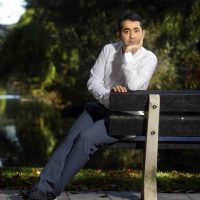The diversity mask
Working towards diversity should be more than ticking boxes, says Ali Vahidi. Academics should be selected for their ability to enrich their subject area and to teach others to deal with others ethically and respectfully.
Working towards diversity should be more than ticking boxes, says Ali Vahidi. Academics should be selected for their ability to enrich their subject area and to teach others to deal with others ethically and respectfully.

(Photo: Sam Rentmeester)
Marie Skłodowska Curie was not only the first woman to win a Nobel Prize but also the first female professor at the University of Paris in 1906, a time when women in most European countries could not even vote. Her achievements demonstrate resilience in overcoming barriers and highlight an academic culture that valued ethics, knowledge, and genuine interest over societal norms.
In academia, which is deeply intertwined with society’s future, aligning individuals’ roles with their passions is essential. Placing people in unsuitable positions hinders scientific progress and imposes unnecessary stress on them, their colleagues, and their students. Promoting diversity merely for appearances can cause significant problems.
Imagine assigning someone who dislikes experimental work to a lab‑intensive role or placing a person with severe allergies in a laboratory setting. Even worse, superficial diversity efforts may lead to hiring people solely to improve gender balance figures, regardless of whether or not they are genuinely committed to ethics and social safety.
Reflecting on recent social safety concerns at TU Delft, one must question how many recent hires were chosen explicitly because their résumés demonstrate a genuine commitment to ethical values and an ability to improve social safety practices. Even if only 10% uphold these standards, it is a promising start.
Concerning that some of those whose behaviour triggered negative social safety reports may still hold positions that allow them to hire students
However, it remains concerning that some of those whose behaviour triggered negative social safety reports may still hold positions that allow them to hire and supervise students, potentially bringing in others who, despite outward differences in hairstyle, clothing style, or skin tone, share the same harmful mindset.
Universities must foster diversity in ways that truly enrich the academic environment. Hiring decisions should rest on passion, expertise, and role suitability, alongside a strong commitment to social safety and inclusion. Initiatives must extend from entry‑level positions to upper management, allowing everyone to thrive in a genuinely safe workplace.
Implementing diversity is not about chasing numbers; it requires an open system that excludes no one on the basis of nationality, sex, or other superficial factors. Instead of fixating on numeric goals, such as gender ratios in managerial reports, institutions should focus on creating environments that are welcoming to all in accordance with regulations. While impressive statistics may look good on paper, if the core issues remain unaddressed, it is like termites silently eroding academia’s foundation.
Such an approach sustains a system that benefits the entire academic community
Achieving these goals demands transparent hiring practices that weigh ethical considerations alongside the needs of those doing the hiring, ensuring knowledge is accessible to all. Such an approach sustains a system that benefits the entire academic community and society. Leadership must embody these principles, measuring success through tangible improvements in workplace culture rather than through quotas or glossy reports.
While pursuing diversity is vital, it must go beyond checklists. Like Marie Curie, whose expertise opened horizons for many, academics should be chosen for their ability to enrich their fields and to teach others to act ethically and with respect. Talented individuals need a safe environment in which to thrive, not just impressive statistics. With the right conditions, genuine progress will follow naturally.
Ali Vahidi has worked in the Department of Engineering Structures at the Faculty of Civil Engineering and Geosciences at TU Delft since 2017. His research focuses on practical innovations and solutions to enhance circularity in construction.
Comments are closed.